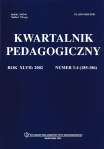PRAXIS W KONCEPCJI PEDAGOGIKI DIETRICHA BENNERA
PRAXIS IN PEDAGOGICAL THEORY OF DIETRICH BENNER
Author(s): Dariusz StępkowskiSubject(s): Education
Published by: Wydawnictwa Uniwersytetu Warszawskiego
Keywords: praxis; aktywność; eksperyment; współczesny model myślenia pedagogicznego
Summary/Abstract: The article presents the place and meaning of praxis in a pedagogical theory of Dietrich Benner (b. 1941), the founder of praxeological approach in the contemporary German philosophy of education. The first section deals with an explanation of praxis as a human phenomenon. According to the Greek tradition it denotes a special kind of human activity, different from techne/poiesis and theoria. According to Benner human activity is unique because the mind as well as the will are involved in it. Therefore, praxis is a way to become a human. In the following part six social manifestations are analyzed. They are: economics, ethics, pedagogy, politics, art, and religion. Each one has become distinct in modern times. Their common features are: freedom, history, and language. In the closing paragraph the pedagogical praxis is described. Education as a distinct social activity is of paradoxical character and is finish-oriented. Benner claims that pedagogical praxis may be put in order by two principles: 1. constitutive principles; 2. regulative principles. Constitutive principles include: a principle of being prone to shaping and principle of calling to person’s own activity. Regulative principles encompass: a principle of pedagogical transformation and principle of non-hierarchical order of all praxis forms. According to German praxeologist realization of pedagogical praxis takes place in three fields: 1. self-rejecting authority relation; 2. education through teaching; 3. cooperation between generations.
Journal: Kwartalnik Pedagogiczny
- Issue Year: 213/2008
- Issue No: 3
- Page Range: 19-58
- Page Count: 40
- Language: Polish
- Content File-PDF

